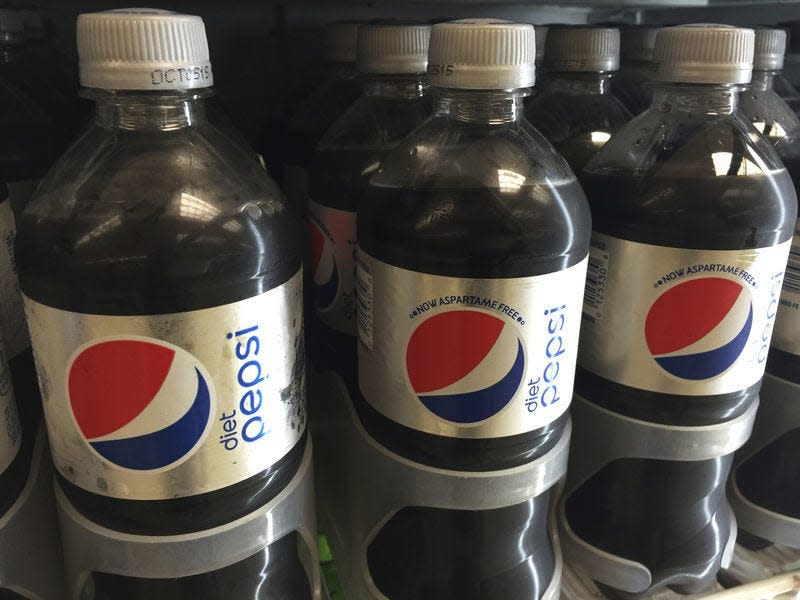Are diet sodas bad for you? What food, drinks have aspartame? The skinny on sugar substitutes
Last week, the World Health Organization released a statement saying aspartame, the lab-made sugar replacement in most diet and low-fat or reduced-sugar foods, is possibly carcinogenic, or possibly cancer-causing.
The Food and Drug Administration released a response saying that regulated amounts of aspartame in food "is authorized by the FDA are safe for the general population under certain conditions of use."
Like sugar, aspartame isn't bad for you in moderation. Large quantities can lead to health issues, but the amount of aspartame allowed in foods and beverages is regulated by the FDA.
Here's a roundup of what to know about WHO's aspartame warning, sugar substitutes, and a list of common foods and beverages containing the artificial sweetener.
What is the warning for aspartame? Who issued the warning?
Scientists from the International Agency for Research on Cancer (IARC), the World Health Organization (WHO) and the Food and Agriculture Organization (FAO) Joint Expert Committee on Food Additives (JECFA) announced last week that aspartame could possibly be carcinogenic to humans.
The announcement doesn’t say the organizations are 100% certain that aspartame is a direct cause of cancer, but that it has carcinogenic properties that need to be studied further as we learn more about cancer and its causes.
How much aspartame should I have in a day?
The FDA released a statement disagreeing with WHO and IARC's assessment on the same day that WHO released its study.
“Aspartame is one of the most studied food additives in the human food supply,” the FDA’s response said. “FDA scientists do not have safety concerns when aspartame is used under the approved conditions.”
The FDA has not changed the threshold for the daily amount of aspartame that’s safe for consumption. That threshold is about 40 milligrams per kilogram of bodyweight – one kilogram is just over two pounds.
A person would have to drink about 12 cans of diet soda a day to exceed the recommended threshold for safely consuming aspartame.
Should I drink that Diet Coke? What WHO says about the potential health risks of aspartame
What is the safest sweetener to use?
No sugar substitute is completely healthy or good for you in large quantities.
“They all have such different chemical structures, so they will all behave differently in the body,” Registered Dietician Nutritionist Jill Weisenberger told USA TODAY. “Adverse effects always come up with a dose amount … so anybody who’s concerned about the safety of it could sometimes use Stevia, sometimes use sucralose and sometimes use monk fruit, just vary it around.”
According to Weisenberger, the dose, or amount of sugar substitutes consumed is what correlates with disease. Much like with real sugar, sugar substitutes themselves are not inherently dangerous to consume, but becomes a problem in large quantities.
How much sugar should I have in a day?
The American Heart Association recommends a maximum of 24 grams of sugar per day for adult women and 36 grams for adult men. And prediabetic or diabetic people should have even less sugar than that.
The new study on aspartame’s carcinogenic properties might have you thinking about tossing your Diet Cokes and Coke Zeros, but one 12-ounce can of regular Coke exceeds both of the recommended maximum intakes for men and women, containing 39 grams of pure sugar.
Is there a healthiest sugar substitute? What to know after WHO's aspartame announcement.
What food and drinks have aspartame?

Here’s a non-exhaustive list of popular foods and drinks that have aspartame in them:
Sugar-free or reduced sugar syrups, like sugar free maple syrups, including Mrs. Butterworth’s and Log Cabin’s sugar free syrups, and some sugar free coffee syrups used for flavoring coffee
Tabletop artificial sweeteners, like Nutrasweet and Equal
Diet or zero-sugar sodas, like Coke Zero, Diet Coke, Diet Pepsi and Sprite Zero
Some powdered drink mixes, like Crystal Light
Sugar-free gums, like Mentos, Extra and Trident
Sugar-free Jell-O
Although all of these products contain aspartame, they’re all FDA approved, meaning when serving sizes are adhered to, they don’t surpass the threshold of how much aspartame one person can consume.
Lianna Norman covers trending news in Palm Beach County for The Palm Beach Post. You can reach her at lnorman@pbpost.com. You can follow her reporting on social media @LiannaNorman on Twitter.
This article originally appeared on Palm Beach Post: Diet, sugar-free, low-fat, aspartame. What FDA, WHO recommend for health

